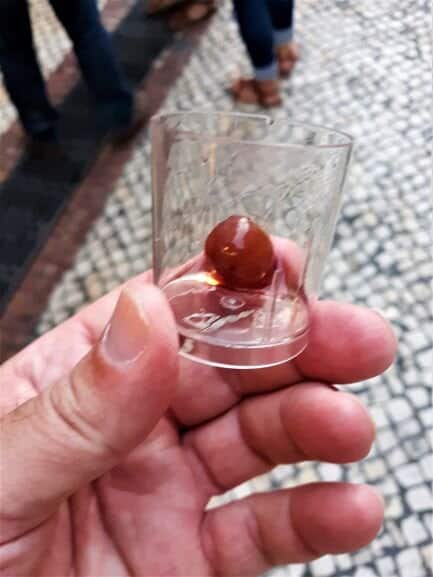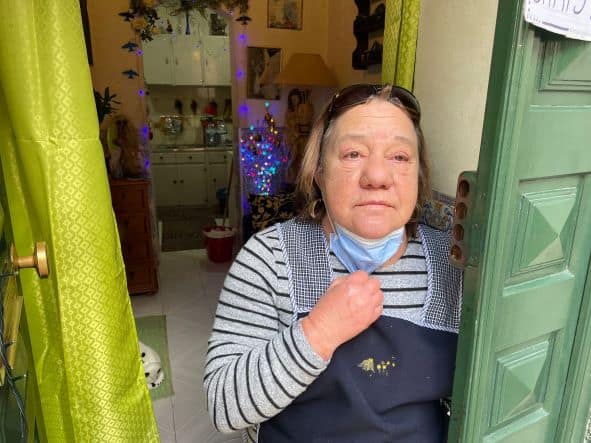Ginjinha is a drink that can be found all over Lisbon. But, for a unique experience, look for a Ginjinha Grandma.
Ginjinha Origin Story

Ginjinha, also known as Ginja, is made by adding cinnamon, sugar, and, sour cherries (Morello) to brandy. The drink was invented by a friar at the Church of St. Anthony in Lisbon who put sour cherries in brandy. He shared the recipe with a Galecian man named Espinheira who perfected the recipe by adding sugar and cinnamon.
Espinheira opened the Ginjinha Espinheira bar in 1840 and today the place, now known as A Ginjinha, is still in business.
If you talk to Lisboetas who are middle-aged or older, they will likely tell you about how their parents and grandparents would give them a little shot of Ginjinha to cure everything from the common cold to a sore throat.
Where to get Ginjinha in Lisbon

You can buy bottles of Ginjinha at local markets and liquor stores. Taking some home is a fun souvenir of your trip. Just remember to secure the bottle in your checked luggage so it doesn’t break.
There are also some cool tiny bars and kiosks where you can get a shot of Ginjinha.
As you order, be sure to tell the bartender if you want your Ginjinha “com elas” or “sem elas.” Literally, this means “with them” or “without them” and ordering your Ginjinha “com elas” or “with them” means that you’ll get a sour cherry from the bottle in your little cup. Some people find the cherry too sour and order theirs “sem elas,” but I love biting into the cherry after downing a shot so I always order mine “com elas.”
A Ginjinha, is the oldest place in Lisbon to get a shot of Ginjinha. It’s nothing more than a tiny bar that opens up onto Rossio Square. Don’t expect to sit down inside and enjoy your drink. There’s only room for a couple people to order inside, so take your little plastic cup, step outside and enjoy downing a shot. Be forewarned, the ground around A Ginjinha will be littered with sticky cherry pits.
Another famous place to get Ginjinha is Ginjinha Sem Rival. They’ve been around since 1890. Their place is a 1 minute from A Ginjinha and the bar is just a bit bigger.
Of course there’s tons of places to get your sour cherry elixir in Lisbon. Try a couple and maybe you’ll find a new favorite. Expect to pay about 1-1.5€, depending on where you go.
That is, unless you get a shot of Ginjinha in an edible chocolate cup. Yes, that’s a thing in Portugal. Down the shot, eat the cup. That might cost you 3€.
Ginjinha Grandma

Wander around the Alfama neighborhood in Lisbon and you’re likely to stumble upon what I call a “Ginjinha Grandma.” Older ladies open up the front (or back) door to their apartment, set up a tiny card table with little cups and bottles of Ginjinha. They might have a homemade sign advertising their wares.
These Ginjinha Grandmas operate outside rules of health inspectors and liquor licenses, selling shots to random passersby.
I was walking in Alfama with Karen and my pal Rob Rose of Raw Travel. We came upon a “Ginjinha Grandma” and even though it wasn’t yet noon, we got a shot of sour cherry yumminess.
“Ginjinha Grandma” didn’t speak any English, but she handed me a little cardboard sign that said “Feliz Natal” and “Obrigado,” which is Merry Christmas and Thank You in Portuguese. She pointed to a nail and I hung the sign for her. At all of 4’10”, “Ginjinha Grandma” couldn’t reach that high.
We enjoyed our shots and Rob, who brought his video camera with him and asked her if he could film. “Foto?”
She said yes and motioned to her apartment behind the doorway. We thought she was telling Rob not to film her apartment. But, it was just the opposite. Her apartment was decorated for Christmas and she wanted to show it off!
You’ll find many of these gray-market “Ginjinha Grandmas” in Alfama, just don’t look for a map, online or otherwise. You’ve got to find “Ginjinha Grandma” yourself.
About the Author

Brent Petersen is the Editor-in-Chief of Destination Eat Drink. He currently resides in Setubal, Portugal. Brent has written the novel “Truffle Hunt” (Eckhartz Press) and the short story collection “That Bird.” He’s also written dozens of foodie travel guides to cities around the world on Destination Eat Drink, including in-depth eating and drinking guides to Lisbon, Porto, Sintra, Monsaraz, and Evora in Portugal. Brent’s podcast, also called Destination Eat Drink, is available on all major podcasting platforms and is distributed by the Radio Misfits Podcast Network.
